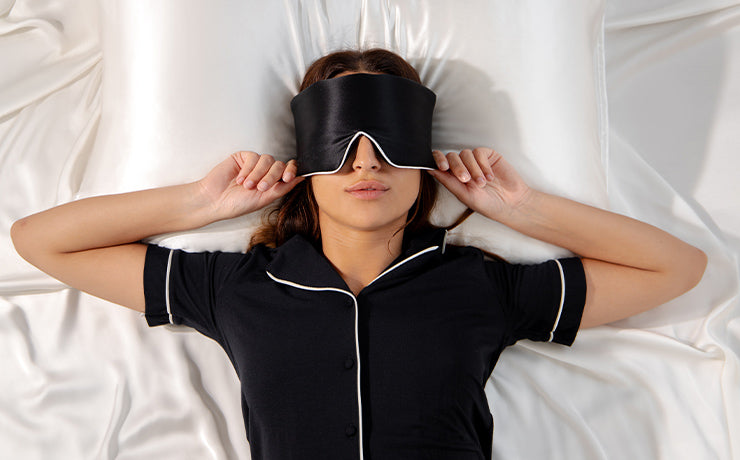Nighttime wellness tips: unwind for deeper, restorative sleep
Good sleep doesn't just happen. It's built by small habits you repeat every night. If you want deeper, more restful rest, you need to create the right conditions before bed. Here's how to set yourself up for a good night's sleep, step by step.
1. Stick to a consistent sleep schedule
Your body loves rhythm. Going to bed and waking up at the same time every day trains your internal clock. It becomes easier to fall asleep and wake up without feeling groggy. Strong sleep patterns help protect you from sleep problems like insomnia or difficulty falling asleep. Try to keep your schedule even on weekends. Following good sleep habits supports deeper cycles, including REM and slow-wave sleep, which restore your brain and body.
2. Power down your devices
Screens glow with blue light that tricks your brain into thinking it's daytime. That delays melatonin production, the hormone that makes you sleepy. Poor screen habits at night are one of the biggest sleep hygiene mistakes people make. Aim to turn off phones, laptops, and TVs at least an hour before bed. Instead, try quiet activities like reading a book, stretching, or journaling to help your mind slow down naturally.

3. Create a calming bedtime routine
Signal to your body that sleep is coming. Simple rituals tell your nervous system to start relaxing. This helps prevent insufficient sleep caused by a restless mind. Here are a few ideas:
-
Take a warm shower or bath
-
Listen to calming music or white noise
-
Light a candle with a soothing scent like lavender
-
Do some gentle yoga or breathing exercises
Find what works for you and stick with it. Consistency helps reinforce healthy sleep habits.
4. Make your bedroom a sleep sanctuary
Your environment has a big impact on sleep quality. Transform your bedroom into a space that your body associates with deep sleep. Focus on these basics:
-
Keep the room cool, dark, and quiet
-
Invest in soft, breathable bedding
-
Use blackout curtains to block outside light
-
Add a sleep mask to create total darkness
People who struggle with sleep disorders, like obstructive sleep apnea, often benefit from a better sleep setup.
5. Watch what you eat and drink
Heavy meals, alcohol, and caffeine can all mess with your sleep. Eating late at night makes your body work on digestion when it should be winding down. Here's what helps:
-
Finish heavy meals at least 2–3 hours before bed
-
Cut off caffeine by mid-afternoon
-
Avoid too much sugar at night
-
If you're hungry close to bedtime, go for light snacks like yogurt or a banana
Small choices like these improve your chances of restful sleep and prevent sleep deprivation from piling up.
6. Move your body during the day
Exercise can help you fall asleep faster and sleep more deeply. It's a simple but powerful way to build good sleep habits. But timing matters. Try to:
-
Get 20–30 minutes of moderate activity most days
-
Exercise earlier in the day if possible
-
Stick to gentle activities like stretching or yoga at night
Late-night high-intensity workouts can raise adrenaline and delay sleep. Aim for movement that energizes you during the day and relaxes you at night.

7. Manage stress before it hits your pillow
Mental clutter can follow you into bed. Racing thoughts are a common cause of poor sleep or sleep problems for many people. Help your mind slow down with simple habits:
-
Keep a worry journal: Write down what's on your mind
-
Practice deep breathing: Try inhaling for 4 counts, exhaling for 8
-
Use guided meditation apps focused on sleep
-
Spend 5 minutes listing what you're grateful for
Relaxing your mind is just as important as relaxing your body.
8. Set a cut-off time for stimulating activities
Scrolling social media, playing video games, or having intense conversations can all fire up your brain before bed. Set a "wind-down" boundary. Give yourself an hour where you avoid anything stressful, exciting, or mentally demanding. The more you practice slowing down, the easier sleep will come.
9. Keep naps short and sweet
Naps can boost energy if you use them wisely. Taking long naps late in the day can confuse your circadian rhythm and disrupt your nighttime sleep. If you nap:
-
Keep it under 30 minutes
-
Nap earlier in the afternoon, not close to bedtime
Short naps refresh you without stealing from your deep nighttime rest.
10. Track your patterns and adjust
Everybody is different. What works for one person might not work for you. Keep a simple sleep journal. Write down:
-
When you go to bed
-
When you wake up
-
How do you feel each morning
-
Anything unusual that happened (late meals, stressful events, skipped workouts)
Patterns will start to show up. Use that information to tweak your habits for even better rest.

A better night starts before bedtime
Deeper, restorative sleep isn't random. It's built by the small decisions you make every night. By creating a calming evening routine, moving your body during the day, and treating your bedroom like a sleep sanctuary, you'll set yourself up for a better night's rest.
At Drowsy, we believe small steps add up. Slip into your sleep mask, take a deep breath, and give yourself the gift of true rest. Your body and mind will thank you in the morning.






